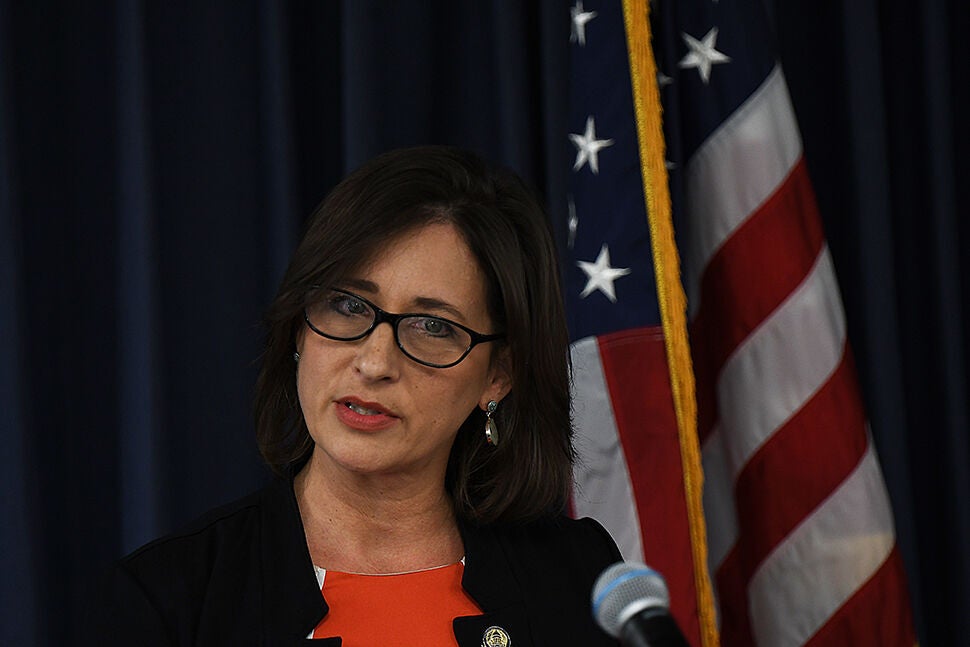Senate approves bills regulating adult-oriented businesses, child sex dolls, AI porn
Published 1:14 pm Thursday, March 7, 2024

- FRANKFORT, Jan. 30 – Sen. Lindsey Tichenor, R-Smithfield, answers questions about a bill related to adult-oriented businesses during a press conference Tuesday, Jan. 30. (LRC Public Information)
Sen. Lindsey Tichenor’s bill to regulate “adult-oriented businesses” passed the Senate Wednesday mostly on party lines.
The Smithfield Republican said adult-oriented businesses present adverse secondary effects on society, including an increase in crime, human trafficking, prostitution, “weakening of public morality,” drug use and “the general erosion of communities.”
“We have recently seen performances that historically have been in the adult entertainment space, but yet have now moved into the public sector and advertised for all ages, specifically for children,” Tichenor said.
For that reason, the legislature should distinguish between performances that are intended for adult audiences and those that are not.
Rep. Nancy Tate, R-Brandenburg, filed a mirror bill in the House, but it has not gone anywhere.
What would the bill do?
Senate Bill 147 would prohibit “adult-oriented businesses” that distribute, display or host sexually-explicit performances from being located within 933 feet – the length of an average city block – from a place where minors may be present.
Those locations include schools, parks, places of worship, recreational areas or any commercial establishment primarily dedicated to children’s entertainment.
Adult-oriented businesses include adult arcades, adult book or video stores, adult theaters, adult cabarets or “any establishment that regularly hosts any performance involving sexual conduct.”
While an approved floor amendment removed the mention of “drag performances,” it still includes performances “with explicitly sexual conduct in which a performer sings, lip syncs, dances, reads, or otherwise performs before an audience for entertainment while exhibiting an exaggerated gender expression that is inconsistent with the biological sex of the performer…” in the adult cabaret definition.
Sen. David Yates, D-Louisville, said he was concerned that the bill referred to drag performances without explicitly naming them.
The bill also restricts what is visible to minors from the outside of adult-oriented businesses.
Businesses would be held liable for any violations, not performers. They may lose their licenses.
Sen. Amanda Mays Bledsoe, R-Lexington, filed a floor amendment to remove a timeframe for compliance in the original bill.
Her amendment would instead allow pre-existing adult-oriented businesses who currently violate this bill to operate indefinitely. It was approved in a voice vote.
Local governments could further regulate adult-oriented businesses as they see fit.
Child sex dolls, AI porn and minor sex crimes
The Senate covered several other sex-related bills Wednesday.
Senate Bill 249, which passed unanimously, would require sex offenders who have committed an offense against a minor to share their full, legal name on social media.
The bill would apply retroactively, and anyone who violates it would face a Class A misdemeanor for a first offense and a Class D felony for all subsequent offenses.
Tichenor, who sponsored the bill, said that social media allows sexual predators access to youth.
“As it stands, predators are allowed to operate under hidden identities under fake profiles, which gives them the ability to groom children in order to lead them by promises or threats into compromising situations that could lead to sexual abuse, human trafficking and sexual exploitation,” she said.
Sen. Christian McDaniel, R-Ryland Heights, asked any kids in the chamber to leave before the final order of the day—House Bill 207.
The unanimously passed bill would regulate the possession of child sex dolls and pornography created using artificial intelligence.
Child sex dolls are anatomically correct dolls with features resembling those of a minor intended for sexual use.
Possession of a child sex doll would be a Class D felony, while trafficking and importing dolls in Kentucky would be a Class C felony under the bill.
McDaniel said a Commonwealth’s attorney raised the issue that possession of a child sex doll cannot be used as probable cause to search any further for child pornography.
The second part of the bill states that if a computer digitization uses an actual minor as its source material, it would be considered child pornography. The state would not have to prove the actual identity, age or existence of the minor for offenders to be convicted.
“This piece of legislation will give our law enforcement the tools that they need to protect our children from predators and exploitation,” McDaniel said.





